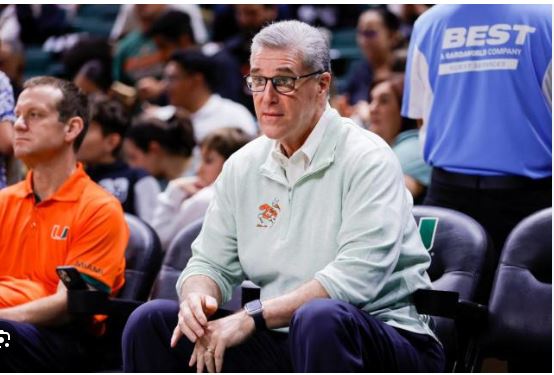
Following Clemson’s decision to join FSU in a legal battle against the Atlantic Coast Conference, the University of Miami is reviewing the issue but has not prepared a lawsuit and has no plans to sue the conference at this time, according to a source who spoke with The Miami Herald on Tuesday.
Meanwhile, UM athletic director Dan Radakovich reiterated Miami’s commitment to the ACC during an appearance with WQAM’s Joe Rose on Thursday.
“Here at the University of Miami we are incredibly solid with the ACC,” Radakovich said in a statement. “It’s a wonderful conference with great organization and access to the College Football Playoff, which is extremely essential. We look at our situation through a very orange and green pair of glasses, asking, ‘Are we in a good location, building our football program?’

“We invested in it, brought Mario Cristobal here, and he’s laying an incredible foundation…” The ACC remains one of the College Football Playoff’s Power Four conferences, and it is a very active and energetic member of that group. We are very delighted to be a part of that—a prominent brand inside the ACC—and will remain so.”
Clemson’s lawsuit against the ACC on Tuesday surprised many and was considered as a first move in the Tigers’ expected attempts to leave the league, even though Clemson did not specifically indicate in the case that it intends to leave.
Clemson filed a lawsuit in Pickens County, South Carolina, challenging the legitimacy of the ACC’s Grant of Rights media deal and exit costs, labelling the withdrawal penalty “unconscionable” and “unenforceable.”
Clemson’s suit also claimed that the ACC’s assertion that it would control the Tigers’ media rights if they left the conference is a “nonsensical reading,” “wrong,” and “inconsistent with the plain language of that agreement.”
In 2013, all ACC teams signed a Grant of Rights agreement that will last until 2036, allowing the league to keep each school’s television revenue even if it leaves the conference.
However, TV money for the Southeastern Conference and Big Ten has increased considerably since then.
UM is one of seven ACC schools that sent officials to the league offices to investigate the Grant of Rights agreement, which is kept under lock and key. However, only FSU and Clemson have sued over the issue.
In the lawsuit, Clemson requests a declaration that the ACC will not control the rights to its games “after Clemson ceases to be a member of the ACC.” Clemson also wants the ACC’s estimated $40 million exit fee declared “an unenforceable penalty in violation of public policy.”
“I really didn’t see [the Clemson lawsuit] coming at this point in time,” Radakovich was quoted as saying. “Almost every school in the ACC has gone to the home office and looked over the documentation to ensure they understand everything related to the grant of rights and television contracts. I was astonished by Clemson’s decision at this stage.
“However, each of these conditions is extremely local. Whether you have constituents on campus making a little more noise, we don’t want to be in a position where we are [disadvantaged]. I assume Clemson looked at it and said now is a good time to reduce exit fees or [try to eliminate] the gift of rights. The same idea applies to Florida State.”
FSU’s case, filed in Tallahassee Circuit Court last December, claims that the ACC breached its contract by failing to provide appropriate value in media contracts and violated Florida’s antitrust statutes. It declared a $572 million penalty for resigning from the ACC “unenforceable.”
In February, the ACC counter-sued Florida State and filed a move to dismiss its case.
A UM source indicated the school is assessing the situation and may behave differently if FSU and Clemson are permitted to leave the conference.
According to a source familiar with the situation, UM has not yet received an invitation to join the Southeastern Conference or the Big Ten. The source stated that UM would listen if either conference called, but its hands are tied at this time.
ESPN reported this week that the level of interest in FSU and Clemson from the SEC and Big Ten is unknown.
The growing dissatisfaction with FSU and Clemson is partly due to the growing money difference between the ACC and the SEC/Big 10.
Tony Altimore, a strategy and analytics expert, predicted the annual television revenue for ACC, SEC, and Big 10 schools once the new 14-team College Football Playoff arrangement goes into effect in 2026.
From 2026 to 2030, he stated that each Big 10 school will receive $96 million in television income rights year, while each SEC team will receive $89 million.
According to Altimore, Notre Dame will pay $80 million, while each ACC school will receive $52 million every year.
The income difference widened this week with the announcement of the redesigned College Football Playoff. Under the new arrangement, each Big Ten and SEC club will get more than $21 million annually beginning in 2026, while ACC teams will earn little more than $13 million each year from the CFP.
“Those dollar differentials aren’t going to change the path of how we move forward as an organization,” he said. “It’s not going to change from how we are looking to build our football, basketball programs.”
One important issue in the FSU and Clemson claims is whether a judge will support the constitutionality of the Grant of Rights agreement.
Radakovich was asked about the Grant of Rights and whether he thinks Clemson and FSU will be able to exit the conference without incurring significant financial penalties.
He referenced the fact that Texas and Oklahoma announced they were leaving the Big 12 for the SEC with four years left on their contract, which included a Grant of Rights clause. The Longhorns and Sooners remained in the Big 12 for three more years until buying out the final year.
“There was no way in those early years that they were able to get out of the Grant of Rights,” he stated. “I am sure they had excellent attorneys. They looked at it and realized there was no getting out of it. So they remained within their league until it came time to leave. I’m not sure whether Clemson or Florida State can change that.
After Clemson filed its complaint on Tuesday, ACC commissioner Jim Phillips and board of directors chair Jim Ryan expressed confidence that the league’s agreement with member institutions would be upheld in court.
“Clemson, along with all ACC members, voluntarily signed and re-signed the 2013 and 2016 Grant of Rights, which is binding through 2036,” according to the press release. “In addition, Clemson agreed on the withdrawal process and procedures. The conference’s legal counsel will zealously enforce the agreement and rules in the best interests of the ACC’s present and new members.”
Radakovich told WQAM that a two-megaconference future is possible, but “I don’t foresee that in the short-term.”

Leave a Reply